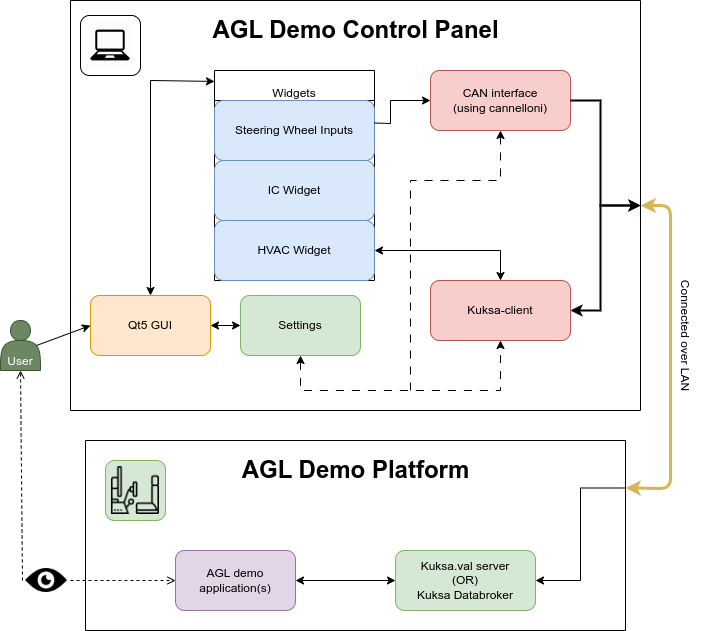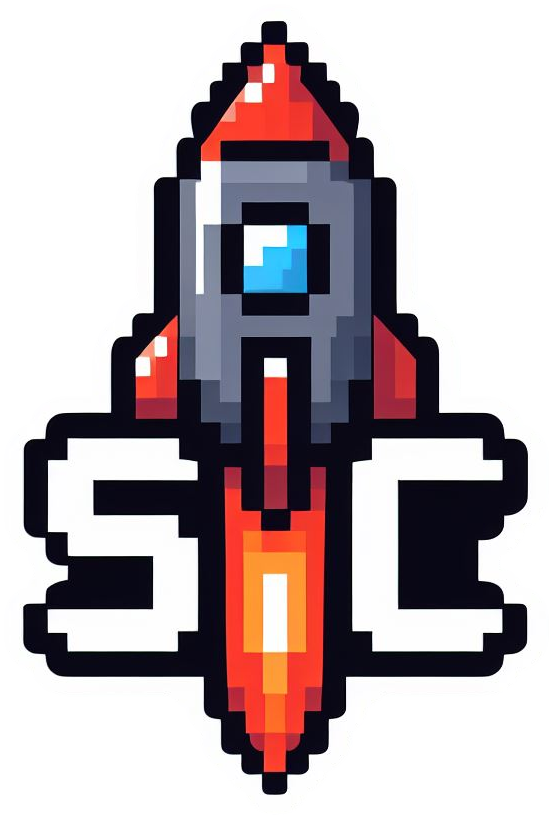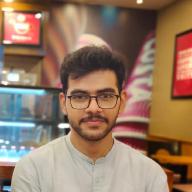Introduction #
This report is a requirement of the Final evaluation phase of the Google Summer of Code the Google program. I worked with the Linux Foundation, under Automotive Grade Linux to develop a Qt5 Application to Visualise/ Simulate CAN bus traffic using Kuksa.val
You can find the proposal for this project here.
The Linux Foundation is a nonprofit consortium dedicated to fostering the growth of Linux. Automotive Grade Linux is an open-source project hosted by The Linux Foundation that is building an open operating system and framework for automotive applications.
Project Overview #

The objective of this project was to develop a Qt5 application that simulates CAN bus traffic using Kuksa.val to integrate with the AGL Demo platform. The application developed allows the end-users to emit signals using the kuksa-client SDK and Python-can to visualize and interact with AGL Demo applications, such as the IC, IVI, HVAC, and the Green Machine, that display CAN data through Kuksa.val.
# Source Code & Documentation #
→ Gerrit: agl-demo-control-panel
→ GitHub: AGL_Demo_Control_Panel
→ Documentation: AGL/documentation
# Deliverables #
- Building a modern Qt5 application using PyQt5/QML that can simulate CAN-Bus signals using kuksa.val.
- Integrate the application with the AGL Demo platform.
- Packaging and distribution of the Application.
- Update documentation pages based on work.
Work Done #
# Progress Reports #
→ Community Bonding Period: During the GSoC 2023 community bonding period, I had a fantastic learning experience. I got to know my GSoC mentors and the AGL community, familiarized myself with AGL tools, and set up my working environment. I also tackled some technical challenges and ventured into working with Kuksa-val-server, Kuksa-client, and AGL images. Overall, the community bonding period was a great start.
→ Coding Period: The coding period of GSoC is a dedicated timeframe during which the accepted contributors work on their projects. The standard coding period is 12 weeks. However, my mentors and I saw it fit to have a longer coding period of 22 weeks to complete our Large-Scale project.
During this period, I was able to:
- Write and submit my code to Gerrit/GitHub.
- Issue patches and bug fixes based on review.
- Regularly communicate with my mentors. (Mondays)
- Participate in the AGL and GSoC community. (Thursdays)
- Submit my work for mid-term and final evaluations.
Below I have compiled all my Weekly Progress Reports for the duration of the coding period of GSoC ‘23.
| Week 1 | Week 2 | Week 3 | Week 4 |
| Week 5 | Week 6 | Week 7 | Week 8 |
| Week 9 | Week 10 | Week 11 | Week 12 |
| Week 13 | Week 14 | Week 15 | Week 16 |
| Week 17 | Week 18 | Week 19 | Week 20 |
| Week 21 | Week 22 |
# Major Gerrit Commits #
- 29339: agl-demo-control-panel: Improve gRPC Mode
- 29311: agl-demo-control-panel: Add Fullscreen / maximized option
- 29302: agl-demo-control-panel: Save user preferences for next session
- 29291: agl-demo-control-panel: Fix Svg icons scaling on Dashboard
- 29279: agl-demo-control-panel: Refactor Settings, Config and UI scaling
- 29275: agl-demo-control-panel: Add installation steps for debian/RPiOS
- 29270: agl-demo-control-panel: Add grpc support for databroker
- 29060: Upload progress on AGL demo control panel in one batch
Conclusion #
# What did I learn? #
- I was able to learn about the OpenEmbedded Yocto Project and create layers and recipes for our specific application.
- I learnt how to create quality applications using Qt, PyQt.
- Learnt about gRPC and WebSocket and how they are implemented in Kuksa.val and its Python SDK.
- I had the opportunity to test my application and AGL images on a Raspberry Pi 4 kindly provided by my AGL mentors. I was also provided a pair of CAN to USB adapters for testing CAN signals. While we ended up not using it for our demo it did help me learn more about CAN interfaces, Linux kernel modules, and Python-can.
- I was also able to test my application using the agl-ivi-demo-control-panel image on ARM, X86 using QEMU/KVM. Additionally, we also got a docker image to work for the agl-demo-control-panel thanks to Lisandro Pérez Meyer.
- I also learned a lot more about the Automotive Grade Linux organization, its development tools, workflow, and pipeline.
# Post GSoC #
- I plan to maintain and add to the Automotive Grade Linux’s repository for my project for the foreseeable future and work on continually improving it.
- I will keep contributing and help other new contributors to explore and learn projects in this organization.
Acknowledgments #
I would like to express my gratitude to my mentors Jan-Simon Möller, Scott Murray, Marius Vlad, and Walt Miner for mentoring me through GSoC and also to the whole AGL community for being so inclusive and friendly.
It has been one of the best professional experiences that I have had this year. Learning about new tools and technologies, and working on an open-source project along with experienced developers from all over the world has been a great experience for me. I would love to continue working with AGL, improving my project, and whatever I feel that I can contribute to.

